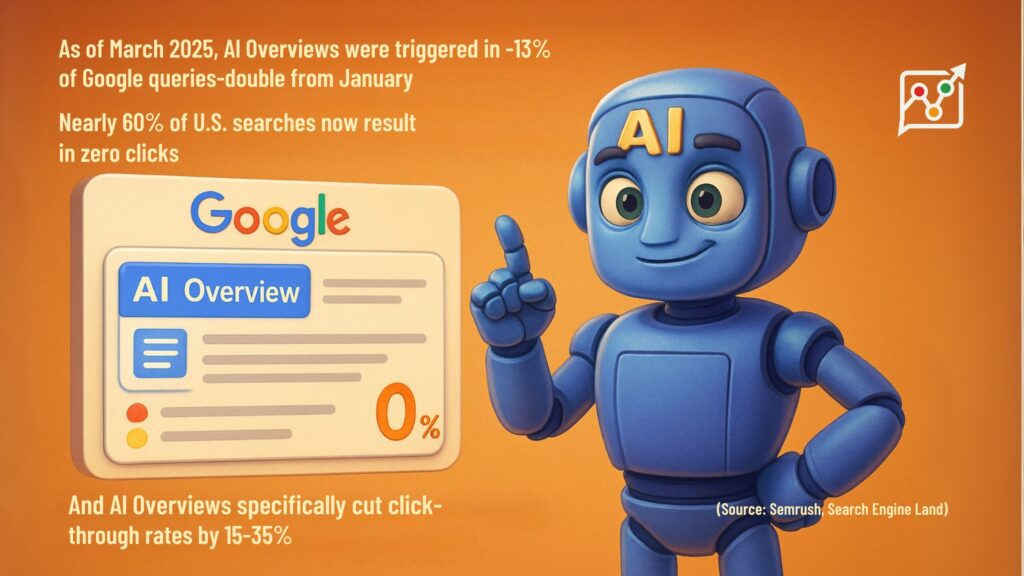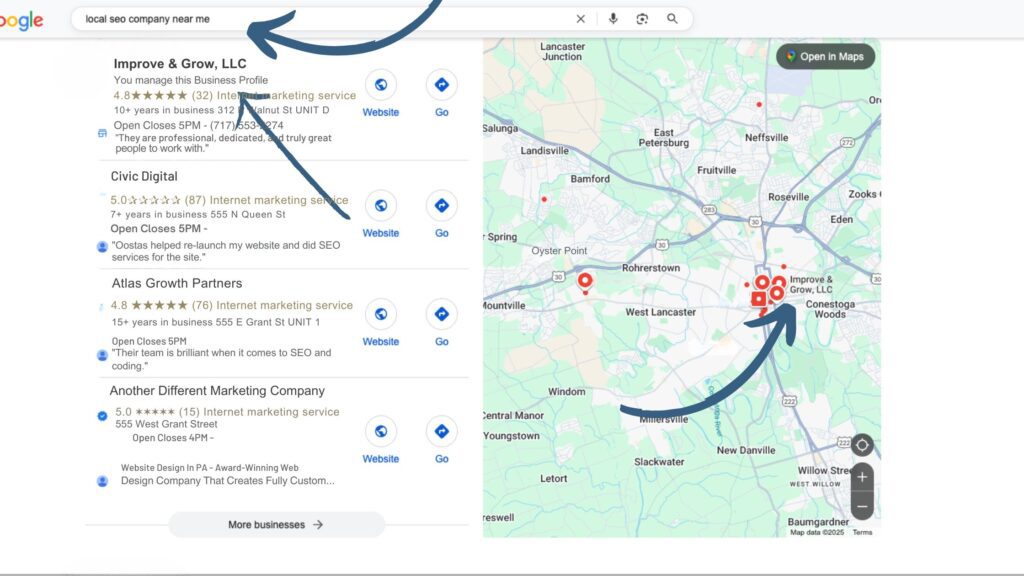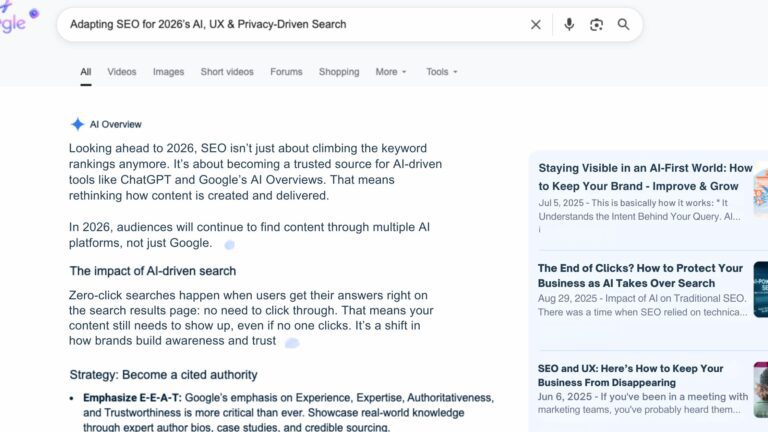Looking ahead to 2026, Search Engine Optimization (SEO) isn’t just about climbing the keyword rankings anymore. It’s about becoming a trusted source for AI-driven tools like ChatGPT and Google’s AI Overviews. That means rethinking how content is created and delivered.
This guide will help you understand how to optimize for LLMs, adjust to the rise of zero-click searches, improve user experience with Core Web Vitals, and adopt privacy-focused strategies that build trust and drive conversions.
Table of Contents
- Why is SEO Changing in 2026
- Becoming the Trusted Source AI Wants to Quote
- Winning in a Zero-Click World
- Diversifying Beyond Google
- Core Web Vitals, UX & Local SEO Still Matter
- The Continued Importance of Local SEO
- Embracing a Privacy-First SEO Approach
- 2026 SEO Checklist
- Conclusion: Preparing for AI-First Search
- FAQs About AI + SEO
Why is SEO changing in 2026?
AI is no longer just a new feature in search. It has become a core part of how people find and understand information online. Search Engine Optimization (SEO) in 2026 isn’t just about getting clicks. It is about building trust, providing clear answers, and becoming a reliable source that AI systems can reference.
Tools like Google’s AI Overviews, ChatGPT’s browsing features, and Perplexity-style search results are changing the way users interact with content.
Stat to Note: As of March 2025, AI Overviews were triggered in ~13% of Google queries—double from January. Nearly 60% of U.S. searches now result in zero clicks (Semrush, Search Engine Land). These trends will only accelerate in 2026.
Becoming the Trusted Source AI Wants to Quote
What Is Answer Engine Optimization (AEO)?
As AI answers continue to take up more real estate in search engine results pages (SERPs), Answer Engine Optimization (AEO) helps your content become a cited source. It’s about creating trustworthy, structured content that’s easy for AI tools to understand and reference. You’re not just optimizing for people; you’re optimizing for machines.
Instead of just targeting keywords, the goal is to deliver clear, factual, and genuinely helpful information that machines can recognize and use to answer real questions. In practice, AEO is not separate from SEO. It is simply a way of applying core SEO best practices with an AI-first mindset.
A year ago, AEO might have seemed like a simple rebrand of SEO, similar to how some companies relabeled machine learning as AI. But it’s better understood as a focused tactic within SEO, much like local SEO. It’s not a separate discipline, just another way to structure and present content so it aligns with how AI tools process and surface information.
Optimizing for Chatbots, Smart Assistants, and LLMs
To optimize for today’s AI-first interfaces, content must be both human-readable and machine-parsable. That means breaking down complex ideas into clear, question-based sections, using the right schema markup, and showing that the content comes from credible, experienced sources. Taking these steps improves your chances of being featured in answers from tools like ChatGPT, Gemini, and voice assistants.
AI Optimization Checklist:
✅ Include natural-language questions in H2s/H3s
✅ Start answers with concise summaries for easier AI citation
✅ Use schema.org markup (FAQ, Article, HowTo)
✅ Provide original insights and cite credible sources
✅ Use conversational tone and structured formatting
What are examples of AEO in action?
You don’t have to guess whether your content is being recognized by AI engines. If your content appears in featured snippets, AI Overviews, or gets cited in ChatGPT or Perplexity, you’re doing AEO right. These are signs your structure and clarity meet AI standards. Having these mentions show that your site’s structure, clarity, and credibility are aligned with what AI systems look for when choosing trusted sources.
Keep monitoring these touch-points regularly and see which pages or topics are most likely to be pulled into AI-generated content. Make adjustments to your formatting, tone, and supporting data to strengthen your authority and improve your chances of being featured more often in future AI answers.
Tip: Don’t loose your brand messaging in this. Learn how to clarify it here >>
Winning in a Zero-Click World
What is zero-click search and why does it matter?
Zero-click searches happen when users get their answers right on the search results page: no need to click through. That means your content still needs to show up, even if no one clicks. It’s a shift in how brands build awareness and trust.

- SparkToro found 58.5% of Google searches overall ended without a click; 37.1% wrapped up on Google entirely (Source)
- And AI Overviews specifically cut click-through rates by 15–35% (Source)
While this might seem like a threat to traditional traffic, it actually represents a new kind of opportunity. Brands that appear in zero-click results gain top-of-mind awareness and being featured in those answers builds credibility (even without a click).
Diversifying Beyond Google
Why should SEO strategies go beyond Google in 2026?
In 2026, audiences will continue to find content through multiple AI platforms, not just Google, making it essential to distribute content across tools like Bing Chat, ChatGPT, and Reddit.
Google remains the dominant player in search, but it’s no longer the only gateway to your brand. In 2026, users are just as likely to find information through AI-powered assistants, curated content platforms like Reddit and Quora, voice search devices, or even direct responses from tools like Perplexity and ChatGPT. Relying solely on Google means ignoring where your audience is actively seeking solutions.
To stay visible across multiple touchpoints:
- Repurpose content for AI-friendly platforms (e.g., Bing Chat, Apple Spotlight, YouTube summaries)
- Engage directly on forums and LLM-trained communities (e.g., Reddit, Quora, Stack Overflow)
- Monitor brand mentions in ChatGPT and Perplexity to evaluate visibility beyond traditional SEO
Core Web Vitals, UX & Local SEO Still Matter
What’s New in 2026’s Core Web Vitals Updates
Even as AI takes over more search interactions, page experience and core web metrics still matter. Optimizing your webpages for INP (Interaction to Next Paint), mobile load speed, and a stable layout helps both humans and AI favor your site. AI systems tend to surface results that load fast and perform well, so keeping strong UX with website support pays off.
Practical Tips for UX-First SEO in 2026
- Design mobile-first interfaces with <2.5s load times
- Simplify navigation and layout to reduce friction
- Apply visual stability practices and responsive interactivity
The Continued Importance of Local SEO
Is local SEO still important in 2026?
Local SEO remains key for businesses serving specific areas. AI and search engines are leaning more on proximity, relevance, and local signals like reviews.
This means well-maintained Google Business Profiles, consistent NAP info, local citations, and structured data for services and events are all vital. It’s not just ranking; it’s about dominating local discovery moments.

Optimizing your Google Business Profile, earning localized backlinks, and maintaining consistent NAP (Name, Address, Phone) information across platforms are table stakes. But today, local SEO also involves structured data for events, services, and reviews making your business easier for AI to recommend in geographic-specific queries.
Showing up in “near me” searches or voice-activated local queries isn’t just about ranking. It’s about owning moments of high-intent discovery.
Not sure what local SEO is? Learn more here >
Building SEO That’s Privacy-Focused
Why is First-Party Data Critical in 2026?
With third-party cookies fading and privacy laws tightening, first-party data is your new best friend. First-party data enables you to personalize content and retarget prospects effectively, all while maintaining trust and compliance. In 2026, success in SEO and digital marketing hinges on your ability to build and use this type of data.
Building Consent-Based SEO Strategies
- Use clear opt-ins with value-driven lead magnets
- Switch to platforms like Plausible or Fathom for analytics
- Avoid intrusive personalization; align with declared intent and on-site behavior
The 2026 SEO Checklist: Aligning AI, UX, and Privacy
Before we wrap up, it helps to translate these ideas into a clear action plan. The following 2026 SEO checklist pulls together the most important steps so you can prioritize what matters most for visibility in an AI-first search landscape.
✅ Write headers and summaries optimized for AI to parse
✅ Use schema markup (FAQ, HowTo, Article)
✅ Polish Core Web Vitals, especially INP and LCP
✅ Be where AI lives: Google, ChatGPT, Bing, Perplexity, etc.
✅ Focus on authoritative, well-cited, structured content
✅ Build a first-party data strategy that respects user consent
✅ Keep tabs on AI citations of your content
Conclusion: Preparing for AI-First Search in 2026
AI-first search isn’t coming…it’s already here. Businesses that get ready now will benefit from lasting visibility, trust, and conversions in a world that values zero-click answers and privacy. By creating content that serves both people and AI, you become the go-to expert worth quoting and keep getting more sales. Pairing this with strong PPC campaign planning also ensures your brand stays visible while organic strategies adapt to the changes ahead.
All of this can feel a bit overwhelming, and that’s completely normal. AI, LLMs, SEO, UX — we get it, it’s a lot. If you’d like, we can hop on a quick chat to figure out the best next steps for your business.
FAQs About AI + SEO
What is Answer Engine Optimization (AEO)?
AEO is the process of structuring your content for direct citation by AI systems like Google AI Overviews, ChatGPT, and Gemini.
How can I make my content AI-ready in 2026?
Use structured headings, clear Q&A formatting, and schema markup. Ensure you highlight original experience and trust signals.
What are zero-click searches and why do they matter now?
In 2026, most search experiences no longer require a click. You need to win visibility in featured results and AI-generated summaries.
Do Core Web Vitals still affect ranking in 2026?
Absolutely. Google and AI engines favor sites with fast, stable, mobile-first performance. INP is especially important now.
How can I ethically collect first-party data for SEO?
Provide high-value content like e-books, newsletters, or reports in exchange for email opt-ins. Be transparent, compliant, and user-focused.



